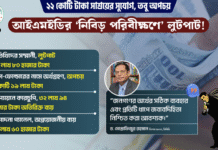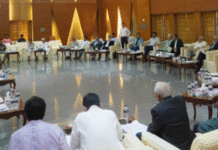MARTYRED INTELLECTUALS DAY: Freedom comes at a price
Daughter of martyred RU teacher shares with Star some untold stories of her father’s killing in 1971

It was around 8:00pm.
A sudden knock at the door of house F-1237 in Ghoramara area of Rajshahi broke the eerie silence of the wintry night in 1971. The knocking sent chills down the spine of Mir Abdul Quayum and his wife.
Then they heard a voice. “Sir, would you please come out?” asked a man behind the door in clear Bangla. His voice sounded soft and polite.
The young psychology teacher of Rajshahi University had been suffering from a cold. His seven-month pregnant wife Mastura Khanam, also a teacher of the same department, told him not to respond.
But Quayum did not listen to her. He took his identity card and opened the door and saw Taiyab Ali, a non-Bengali stenographer of the RU registrar office, who was known among locals a collaborator of the Pakistan army.
“Sir, an army captain wants to talk to you. He is waiting in his vehicle at the end of the alley,” Taiyab told him.
“Well, show me the way,” Quayum replied and followed Taiyab.
The 32-year-old teacher, known among students as a freethinker, left his home on the night of November 25, 1971 and never returned. He is one of the scores of intellectuals who were rounded up in a similar fashion, tortured and killed just days before Bangladesh won the Liberation War.
Sensing imminent defeat, the Pakistan army along with local collaborators had orchestrated a plan to destroy the future of the soon-to-be born country by wiping out the Bangalee intelligentsia.
Quayum was one of the victims of that evil design. His body was found in a mass grave on December 30, 1971.
According to Banglapedia, around 991 academics, 13 journalists, 49 physicians, 42 lawyers and 16 other intellectuals were killed during the war.
On December 22, 1971, Dainik Azad published a report quoting Indian radio channel Akashbani news where Ruhul Quddus, then secretary general of the Bangladesh government, said at least 280 intellectuals and professionals were killed on December 14 and 15 in Dhaka, Sylhet, Khulna and Brahmanbaria.
Ahead of the Martyred Intellectuals’ Day today, when the nation will pay its tribute to the luminaries martyred during the Liberation War, Quayum’s daughter Prof Mahbuba Kaniz Keya revealed some untold stories about her father’s martyrdom to The Daily Star at her home on RU campus.
When freethinking and students’ involvement in political activism came under attack by Pakistani invaders, Mir Abdul Quayum had dared to choose those very topics for his academic research.
Prof Keya, now a teacher of psychology at RU, is the second of Quayum’s four children. She was only five in 1971.
“My father knew this was inevitable and wanted to keep his family away from his impending fate,” she said.
She learnt more about that night and her father from her mother and her uncle, Mustafizur Rahman Khan Alam, who is a freedom fighter. She also read her father’s diary and studied every document she could find mentioning her father.
“Bangladesh will be born, but I doubt if I will be there to witness that,” Keya quoted her outspoken father as saying to his family, friends and colleagues.
“He believed in the independence of Bangladesh. And he was aware of what he was doing. Otherwise, how could he be so certain about the fate of Bangladesh, but at the same time, be so uncertain about his own life?”
When the war broke out, Quayum and his family used to live on the top floor of a three-storey building in Rajshahi’s Malopara area, some 5 km away from RU campus.
Before the Pakistan army usurped Rajshahi on April 13, Quayum took his wife and children to his wife’s village home in Alaipur area of Bagha upazila. He was in touch with freedom fighters in the area and kept the flat available for them to use.
But Quayum had to return after a month following repeated radio announcements made by the Pakistan government urging employees to join their workplaces.
“Returning home, we found that our flat was burnt down and Pakistan army men had camped at the nearby T&T office.”
Quayum then moved in with his in-laws who lived in Ghoramara area. He was abducted from there.
Besides teaching, Quayum spent his time secretly helping the freedom fighters.
“My elder brother once saw my father talking to a freedom fighter…. My father then asked my brother not to tell anyone about it.”
Despite being a teacher of psychology, Quayum began studying law and English literature.
“He applied to different universities in North America to study student politics and freedom of thought.”
Prof Keya said the Liberation War Museum has some record of his research.
The psychology department at RU was full of collaborators during the Liberation War. They closely watched Bangalee teachers and informed the Pakistani army about them.
“They were fully aware of my father’s academic activities. I strongly believe that some of his colleagues helped the Pakistan army in identifying him.”
Quayum’s body was found at the Babla Bon mass grave on the bank of the Padma river at Sreerampur area on December 30, 1971. At least 14 bodies were found in the grave.
His brother-in-law Mustafizur Rahman Khan Alam, a freedom fighter, identified the body.
“The neck and waist of all the martyred were tied together with a single rope. None of them had any bullet injury. Everyone thought that they had been buried alive,” Alam told this correspondent.
Quayum was buried at Hatim Khan graveyard later.
In December 1971, Al-Badr, mostly comprising the members of Jamaat’s student wing Islami Chhatra Sangha, intensified its atrocities. It systematically picked up teachers, writers, doctors, lawyers, journalists and other professionals from their houses, tortured and killed them en masse and dumped the bodies at different killing grounds.
Among them were journalists Serajuddin Hossain, Syed Najmul Haque, ANM Golam Mostafa, Nizam Uddin Ahmed, Selina Parvin, Shahidullah Kaiser, Dhaka University professors Giasuddin Ahmed, Sirajul Haque Khan, Dr Abul Khayer, Dr Faizul Mohiuddin, Rashidul Hasan, Anwar Pasha, Santosh Chandra Bhattacharyya, Munier Chowdhury and Mofazzal Haidar Choudhury, and physicians Mohammad Martuza and Fazle Rabbi.









